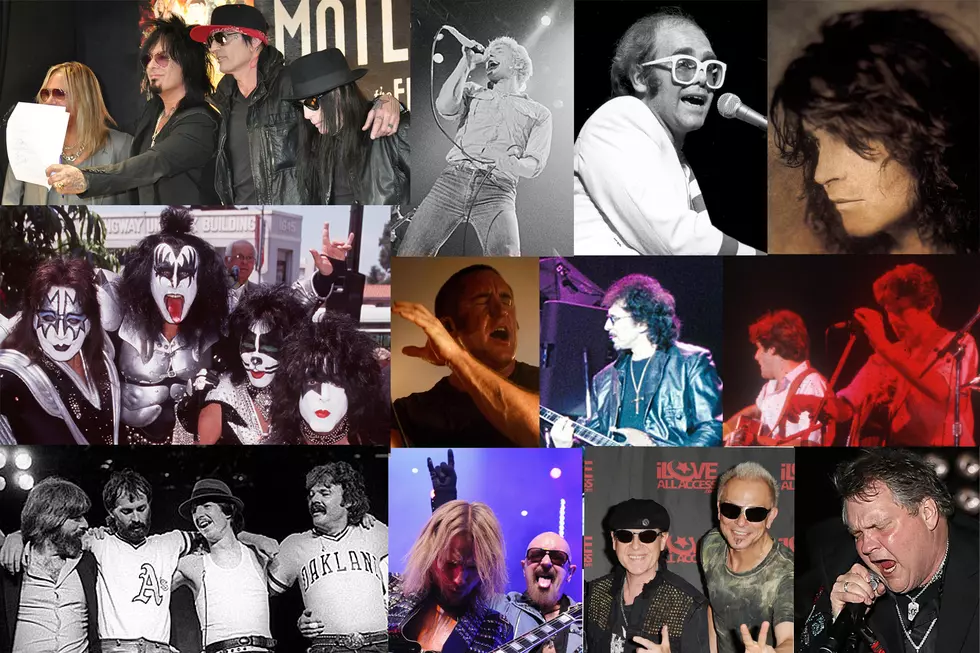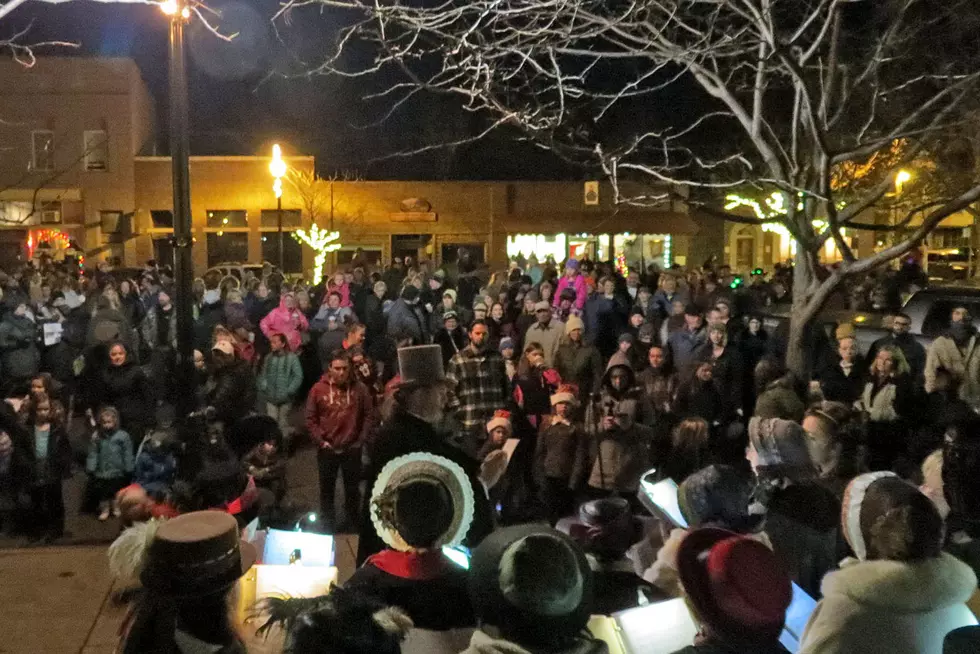
Fake Farewells: All the Ways Rock Stars Lied About Not Reuniting
Rock history is filled with bands and solo artists who, at one time, bid farewell to their fans only to return down the road at a point down the road. And while cynics often criticize the decision to reunite as a cash grab and nothing else, it's ultimately the fans that win. Let's take a look at some of the more memorable "final tours" that never were.
Eagles
Why they broke up: Tensions in the Eagles were running high in 1980. Things were so bad that co-founder Glenn Frey and guitarist Don Felder even exchanged barbs and threats on stage. While the pair didn't come to physical blows after the ill-fated performance, the writing was on the wall. The band was done.
What they said: Asked about the possibility of the band reuniting down the road, co-founder Don Henley insisted the group would only reunite "when hell freezes over."
How long until they got back together: In 1993, the Eagles flew again, appearing together in a video country star Travis Tritt's cover of "Take It Easy," followed by the next year's aptly-named Hell Freezes Over tour, on which they played 160 shows across the world. And despite the release of the Farewell 1 Tour: Live From Melbourne DVD in 2005, Frey admitted in an interview on the DVD that the title had nothing to do with a plan to quit touring.
Why they broke up (again): Frey's unexpected passing at the outset of 2016 understandably put the band's future in doubt. Henley went so far to confirm the band was done just two months later.
How long until they got back together (again): The band was re-born for a second time in 2017 and included Vince Gill and Glenn Frey's son Deacon in their ranks. Henley has intimated that the band wouldn't have been able to resurface without "Frey family blood" being part of the group.
Elton John
What he said: Just a little more than two years after a suicide attempt, Elton John was only a handful of songs into his Nov. 3, 1977 show at London's famed Wembley Arena when he stunned the crowd by saying, “I haven’t been touring for a long time and it’s been a painful decision whether to go back on the road ... but I’ve made a decision and this is the last show I’m gonna do.”
How long until he was back on the road: By February 1979, John was back on the road, performing with only percussionist Ray Cooper on a lengthy series of dates that saw him play in the Soviet Union.
What he said (again): Although John had, as recently as 2016, denied retirement was in the cards, he also admitted years prior that the arrival of his son Zachary had forced him to re-evaluate his role both as a father and an entertainer. And so, at the outset of 2018, John confirmed he would embark on a three-year farewell tour, clarifying it marks the end of his touring career. However, longtime guitarist Davey Johnstone believes they'll still occasionally perform at festivals or one-off dates.
Motley Crue
Why they broke up: Amid much pomp and circumstance, Motley Crue signed a "Cessation of Touring Agreement," which stated that all four members agreed never to tour again as Motley Crue -- unless they all agreed to do so. The Crue's then-final tour date, Dec. 31, 2015, was recorded for the The End: Live in Los Angeles CD and DVD.
What they said: “We always had a vision of going out with a big fucking bang and not playing county fairs and clubs with one or two original band members,” drummer Tommy Lee said. "You guys in the press, you keep looking for the loophole," added bassist Nikki Sixx. "We're gonna stick to our word."
How long until they got back together: Five years. Following the release of The Dirt biopic in 2019, the group was, arguably, bigger than ever, reportedly seeing a 350 percent increase in music streaming, while a new generation of fans was hearing the band for the first time. Not surprisingly, this led Motley Crue to blow up its "Cessation of Touring Agreement" in typical Motley fashion: loudly and without reservation.
The Who
What happened: A little more than three years after drummer Keith Moon died, the Who were feeling out of sorts with each other. Pete Townshend also wanted to focus more on his solo career. There was no shortage of factors that caused the Who to go their separate ways following the tour in support of 1982's It's Hard.
What they said: "I knew in my heart that the Who had lost contact with our fanbase," Townshend wrote in his autobiography, Who I Am.
How long until they got back together: The Who reunited to play Live Aid in 1985 but didn't mount a full-fledged tour until 1989, in commemoration of their 25th anniversary. Not everyone was so impressed. The Los Angeles Times said [the band] "conjured up visions of a veteran prizefighter who, driven by either ego or money, just can't call it quits."
How long until they got back together (again): In 1996, the Who rose yet again, reuniting to perform Quadrophenia, and has continue to regularly perform since.
Kiss
What they said: Following a successful worldwide tour in 1996-97 that saw them reunite with founding members Ace Frehley and Peter Criss, Kiss embarked on a farewell tour at the turn of the 21st century. "Sometimes people think that when you announce a farewell tour, it's a ploy [and] that you're going to do it again and again," Paul Stanley said. "Some bands have made careers of farewell tours [but] we've never said we were going to do this before. It's better to leave a little early than to stay too late."
How long until they were back on the road: In 2004, Kiss returned with guitarist Tommy Thayer in Frehley’s place, and Eric Singer on the drum stool formerly occupied by Criss.
What they said (again): After successfully touring this stable lineup for close to a decade and a half, Kiss announced their End of the Road tour during an appearance on America's Got Talent in September 2018. The band's final show will take place in their hometown of New York on July 17, 2021. Kiss manager Doc McGhee revealed that every surviving former member of the band has been approached about potentially taking part in the group’s last show.
Meat Loaf
What he said: Citing the rigorous physical demands of performing and traveling, Meat Loaf decided to quit following his spring 2013 tour of Europe, which he dubbed the Last at Bat. The singer said he wanted to perform at his best and, in comparing himself to Rolling Stones vocalist Mick Jagger, joked he hadn't seen the same "wear and tear" that he had.
What happened: By September of the same year, he was participating in a Storytellers-like series in Las Vegas. The singer resumed touring in 2015. In early 2018, Meat Loaf disclosed medical issues that, at the time, he felt could threaten his ability to sing, but, as of press time, he has not yet given up performing.
Ozzy Osbourne
What he said: Citing a desire to spend more time with his family, along with a false diagnosis of multiple sclerosis, Ozzy Osbourne was ready to give up tour life and embarked on his No More Tours retirement jaunt in mid-1992. The tour wrapped up approximately five months later. "It's a farewell gig in the respect I won't be doing any fast-lane, living out of a suitcase anymore. I've got kids that I want to spend more time with at home and less time on the road," Osbourne said in a 1992 interview.
How long until he was back on the road: When Ozzy learned he wasn't in a battle with MS, he decided to resume his career. In June 1995, he launched the cheekily named Retirement Sucks! tour, followed by the release of Ozzmosis that October.
What he said (again): Less than a year after his farewell tour with Black Sabbath concluded in 2017, Osbourne referenced that first solo farewell trek when he announced his No More Tours 2. But even there he's leaving the door open to future shows. "This will be my final world tour," he said, "but I can’t say I won’t do some shows here and there."
Scorpions
What they said: In 2010, Scorpions announced plans to call it quits following the promotional cycle for Sting in the Tail. In a video interview, vocalist Klaus Meine said, "We don't think about reunions because we said it's a farewell tour. After 40 years and a long career, we feel we owe it to ourselves and our fans to end our career on a high note."
What happened: While on the road in support of that album, the German heavy metal legends noticed that they were now connecting with a younger generation of fans and had a change of heart. Speaking with the Arizona Republic in 2017, Scorpions guitarist Mathias Jabs said the whole idea for a Scorpions "farewell tour" came from their manager at the time and that the musicians didn't really want to quit. "We thought, rationally, it might be a good idea to say 'bye bye' while we were still in the best shape, leave the scene with the best impression and be remembered as a band that runs around like crazy. ... So we postponed the end of everything and now we don’t know. We learned also that there is no point in saying, 'This is the very last concert!'"
Doobie Brothers
Why they broke up: The Doobie Brothers had endured a plethora of lineup changes over the years but were simply burned out by the time the '80s had arrived. They managed to squeak out one final studio record, 1980's One Step Closer, and a farewell tour in 1982 before bringing the curtain down on the band.
What they said: We couldn't find any quotes from them at the time, but Jack T. Colton (Michael Douglas in Romancing the Stone) was pretty pissed when he found out about it.
How long until they got back together: In 1987, most of the former Doobie Brothers reunited for a series of benefit concerts, which in turn led to a successful reunion tour and hit single ("The Doctor") approximately two years later. The band has since sustained a life on the road, with a 50th anniversary tour that brings Michael McDonald, who has periodically contributed to the group since that initial breakup, back into the fold.
Judas Priest
What they said: Judas Priest intended for their 2011 Epitaph World Tour to be their last, with founding guitarist K.K. Downing even retiring six weeks before the first show. He later admitted relationships within the band were strained and that it was a contributing factor to his decision. "[The farewell tour] is hardly the end of the band by any means [but] it's our last world tour," Glenn Tipton said in a 2011 press conference. "It takes a big chunk out of your life. We've been doing it for nearly 40 years now [but] it's not to say it will be our last show. We would never turn down appropriate dates if we were offered them in the future."
What happened: While on that "final" tour, the band found themselves unexpectedly energized by new recruit Richie Faulkner and announced plans to stay together. They have since released two studio albums, 2014's Redeemer of Souls and Firepower in 2018. The band is slated to spend most of 2020 touring Europe and Asia.
Nine Inch Nails
Why they broke up: In 2009, Nine Inch Nails leader Trent Reznor was ready to bid farewell to the road with the Wave Goodbye tour. At a New York stop at the outset of the tour, he told the audience, “This is fucking tiring up here, man. Usually I have a stunt double fill in and robots. I’m too old for this shit."
What they said: Trent Reznor told an Asian publication he feared ending up like "Gene Simmons, an old man who puts on makeup to entertain kids, like a clown going to work."
How long until they got back together: In early 2013, Reznor announced the band, complete with a revamped lineup, would take to the road. “I was working with Adrian Belew on some musical ideas, which led to some discussion on performing, which led to some beard-scratching, which (many steps later) led to the decision to re-think the idea of what Nine Inch Nails could be, and the idea of playing a show. Calls were made to some friends, lots of new ideas were discussed, and a show was booked – which led to another, which somehow led to a lot of shows.”
Black Sabbath
Why they broke up: Given the sheer number of lineup changes they endured over the years, it wasn't until 1999 that Black Sabbath was so serious about quitting they went so far to name their tour The Last Supper. Asked in an interview if this truly was the last Sabbath tour, guitarist Tony Iommi replied, "It's hard for me because I've carried the flag all these years so it's tough to think about. So we don't really know - I don't really know - what's going to happen. You can never say never, can you?"
How long until they got back together: As with Osbourne's premature retirement earlier that decade, it wasn't meant to be. A little more than a year after the last concert on The Last Supper tour, they were recording with Rick Rubin. Although those tracks were never completed, they regrouped, albeit without drummer Bill Ward, in 2011, for 13. In 2016, they embarked on another final trek, The End, which wrapped up on Feb. 4, 2017 in their hometown of Birmingham, England. Is it truly the end though? Before the haze of smoke and dry ice had even completely dissipated from that last show, Tony Iommi said he was certain there was more to come from the band. More recently, original Black Sabbath vocalist Ozzy Osbourne said he'd like one last show with Ward, who didn't participate in the band's final tour in any capacity, so time will tell.
Status Quo
What they said: In 1984, Status Quo launched the End of the Road tour' a 10-week stretch across Europe and the U.K. They had confirmed that they planned to continue writing and recording, however. Asked why the band was calling it a day, Status Quo's Francis Rossi said they wanted to be sure they were exiting at the peak of their game. "I'd rather go out now when people might say, 'They were still good' rather than waiting another two or three years."
What happened: Two words: Live Aid. The band was asked to open the Wembley Stadium show and never really looked back after that. Sadly, Status Quo guitarist Rick Parfitt passed away in late 2016, leaving Francis Rossi as the only original member of the group.
More From 96.3 The Blaze










